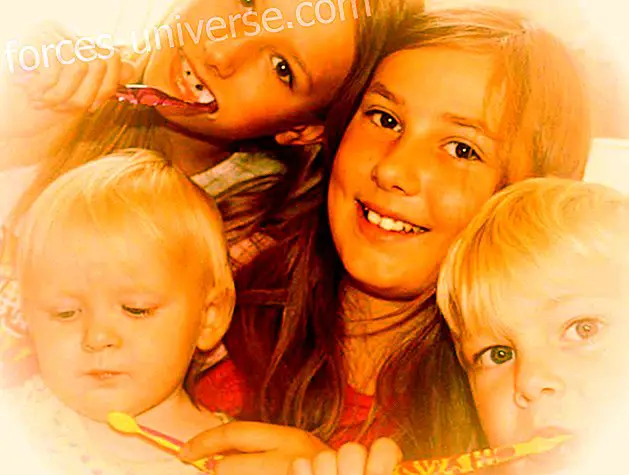
"Feelings are not simple emotions that happen to you. Feelings are reactions that you choose to have. If you own your own emotions, if you control them, you will not have to choose reactions of self-defeat. When you learn that you can feel what you prefer or choose to feel, you will begin to take the true path of intelligence. Wayne Dyer
In the last two decades there has been much talk about the importance of emotional intelligence that can even be much more momentous than a person's IQ. Well, certainly, the intelligent management of our emotions can determine our success or failure in all aspects of our lives, whether at work, with the family, in friendship and relationships, even affecting our health and self-esteem. But what is emotional intelligence? “The term emotional intelligence refers to the human capacity to feel, understand, control and modify emotional states in oneself and others. Emotional intelligence is not to drown emotions but to direct and balance them. That is, it is the ability to manage emotions well. Both ours and those of others. A person who gets angry easily, who gets sad often or who is not able to control their impulses is someone with poor emotional intelligence. On the contrary, a person who knows himself well, who is able to think before acting, who understands his impulses, who expresses them with moderation being honest but, at the same time, managing not to negatively affect the people who surround has excellent emotional intelligence. ”
And what are emotions? How do they affect or help us?
"The word emotion comes from the Latin" motere "(move). It is what makes us approach or move away to a certain person or circumstance. Therefore, emotion is a tendency to act and is frequently activated by some of our impressions recorded in the brain, or through cognitive thoughts, which causes a certain physiological state, in the human body . Emotion is a feeling and its characteristic thoughts that carry biological and psychological conditions, as well as a series of inclinations to acting. All emotions are essentially impulses to action, each of them inclines the human being towards a certain type of behavior ”. In animals and children there is a total continuity between feeling and action; in adults there is a separation, the action does not necessarily follow the feeling. The mechanisms of emotions, including biological ones, can be driven towards good or evil . The temperament is modifiable according to our experiences. And being aware of your own emotions is the first step to not get carried away by them.
The types of emotions
Primary Emotions
? Anger: Anger, bad temper, anger, resentment, hostility, animosity, indignation, irritability, violence and hate. Blood flows to the hands, and thus it is easier to take a weapon or hit the enemy; The heart rate rises, as does the level of adrenaline, which guarantees that any vigorous action can be accomplished.
? Fear: anxiety, distrust, phobia, fear, nervousness, restlessness, terror, worry, apprehension, remorse, suspicion, dread and panic. Blood goes to skeletal muscles, especially those in the legs, to facilitate flight. The organism is put in a state of general alert and the attention is fixed on the near threat.
? Happiness: joy, enjoyment, relief, delight, bliss, fun, shivering, ecstasy, gratification, pride, satisfaction and mania. Increases the activity of brain centers that inhibit negative feelings and disturbing thoughts. The body is better prepared to face any task, with good disposition and general state of rest.
Types of emotions
? Love: acceptance, adoration, affinity, kindness, giving with selflessness, charity, trust, devotion, dedication, kindness and even obsession. It is the physiological opposite of the state of "fight or flight" that anger and fear share. Parasympathetic reactions generate a state of calm and satisfaction that facilitates cooperation.
? Surprise: amazement, stupefaction, wonder, shock. Raising the eyebrows allows greater visual range and greater illumination in the retina, which offers more information in the event of an unexpected event.
? Disgust: annoyance, annoyance, dissatisfaction, impatience. The facial expression of disgust is the same throughout the world (the upper lip twisted and the nose pursed) and it would be a primary attempt to block the nostrils to avoid a harmful smell or spit out harmful food.
? Sadness: affliction, self-pity, melancholy, discouragement, hopelessness, grief, grief, loneliness, depression and nostalgia. The decrease in energy aims to contribute to adapt to a significant loss (resignation).
Shame: repentance, humiliation, mortification, remorse, guilt.
? Repulsion: Rejection, aversion, disgust, disdain, contempt, contempt.
All these emotions almost never appear isolated, rather, they are a combination of all the mentioned emotion families.
Have control of emotions equal to Emotional Intelligence
Previously, many people thought and believed that an "intelligent" person was one who stood out for his special abilities in mathematics, for his analytical ability among other intellectual abilities. That is, by their IQ. However, with the passage of time and after numerous studies it has been proven that people who achieve success and a life of well-being is because they have developed a great skill in managing their emotions for the realization of their dreams . This is emotional intelligence.
Intellectual coefficient (IQ) and emotional intelligence (EI) are different abilities, but they are not opposite but rather complementary . The person with a high IQ is more analytical and logical, accumulates data, requires time and calm to make decisions, weighs the information, examines, is numerical, tends to be cold in his assessments and uses the left hemisphere much more. On the other hand, the person with a high EI is easily related, likes new ideas, decides from attempts and mistakes, is quick, spontaneous, tends to be impatient and inaccurate, believes in his feelings, is warm and gregarious and uses plus the right hemisphere of the brain.
Qualities of Emotional Intelligence
1. The person knows his own emotions: self-awareness (recognizing a feeling while it occurs) is the key to emotional intelligence . Know at every moment what emotion we are feeling, without confusing it with another or disguising it.
2. The person manages his emotions: he does not allow them to control him and knows how to channel them correctly. (It is based on the previous capacity). People who know how to calm down and get rid of anxiety, irritation or excessive melancholy recover more quickly from life's setbacks.
3. The person is self-motivated and self-regulates: the person who knows how to control impulsiveness and wait to get their reward, meet their goals and is satisfied with their achievements.
4. The person is emphatic: he has the ability to recognize the emotions of others, to know what they want and what they need is the fundamental ability to establish social relationships and personal links. Solid and durable.
5. The person correctly manages their relationships: this means that they know how to act in accordance with the emotions of others: which determines their leadership capacity and popularity.
From all of the above, it is evident that in our daily life, Emotional Intelligence must lead us to the management and expression of our emotions in a way that allows us to be more effective in our interpersonal relationships.
In the face of work and everyday life it is normal that we play three main basic roles: the Hero, the Villain and the Victim. Each of us in the different circumstances of our lives, we choose to act in one way or another and it is precisely the emotions that we decide to use that set the tone.
Specifically, one of the most obvious applications in our daily life of Emotional Intelligence, is presented every time we have a conflict or problem. It is easy to assess yourself by observing how we react if we explode at the slightest provocation, if we get angry and scream. Or yes, we try to fix the problem through dialogue, expressing ourselves with sincerity but with restraint without fuss.
In summary, the control of our emotions and how we channel them indicate the level of emotional intelligence we have. And at the same time it is an indicator that allows us to know the perspective that the person has of life, how he feels: happy or unhappy, emotions are like a thermometer that informs us if we are tuned to a high or low frequency ; or yes, we are in a stage of evolution or involvement.
Fighting our inner demons
Now the time has come to talk about our inner demons that are inherent in our emotions, since depending on our level of emotional intelligence these demons will be present to a greater or lesser extent as the case may be. The internal demons are those that are born inside a person and that throughout their life they develop until they are made powerful by the conferred attributes. Among the most powerful demons we find the seven deadly sins: greed, envy, gluttony, anger, lust, laziness and pride. These act in such a way that they can dominate a person's mind, feelings and body. ” This explains that demons are not only limited to evil beings or fallen angels, but are the destructive emotions that can wreak havoc in our lives by becoming unhappy and perverse people. Hence, the importance that from very early childhood our parents or the people who are in charge of the infants are people with a good emotional intelligence; This is emotionally competent to guide us in the control and channeling of our emotions.
In addition to capital sins, there are other types of frequencies or emotions of low vibration that once they enter our lives, they diminish our emotional tone and little by little we wilt like a flower. Losing the joy of living, there is no harmony in our relationships and every time we move further away from achieving our dreams. Among the most common frequencies are: guilt, insecurity, fear, narcissism, selfishness, sadness, vanity, anorexia, bulimia, worry, distrust among many others.
And what to do to fight these inner demons?
First , it is important to take stock of our lives and see what areas are affecting us and then take action to exclude them. Recognizing and knowing that demons are causing us wrong is not enough, you have to fight them through change. And this consists of a new way of thinking, that is, reprogramming ourselves positively. The most immediate results we will obtain are that our attitudes cease to be temperamental, and we will conduct ourselves with greater restraint and intelligence . We also need a good dose of faith, will and love. And it is precisely, the latter our best antidote to fight against these demons. If love is present in our lives until the most adverse trials we will face them with great strength. It should be remembered that in this war against internal demons the role of our self-esteem plays a key role.
Self-esteem: love for ourselves
Self-esteem (also known as self-concept) consists of a series of thoughts, behaviors and emotions directed towards oneself. What we think of us at all times, how we talk to ourselves, how we treat ourselves, what we do when we make a mistake, when someone criticizes us, when we succeed, when they flatter us, when we fail ... In short, everything we have lived and sense is shaping our self-esteem for strengthening or detriment. This tells us that when someone has a good self-esteem, he is a person who accepts himself as he is, with his qualities as with his defects. He has an optimistic and positive view of life. It enjoys an emotional balance, that is, it has an emotional intelligence that allows it to successfully cope with mood elevators and the various events of life. He is a person who is characterized by his enthusiasm, his creativity and his high degree of self-confidence. Love and take care of your body.
In contrast, people with low self-esteem project insecurity, fear, and that leads them to be jealous, envious, pessimistic, depressed, frustrated. They can hardly take risks, because they doubt their own abilities. People with low self-esteem are emotionally dependent people, since for them the opinion and approval of the people around them is extremely important. Which creates a distorted image of themselves, because they are not authentic. Since for the sake of pleasing others they cease to be themselves. They are also usually ashamed of their body or a part of it.
Loving oneself unconditionally, is not a selfish attitude, on the contrary it is an intelligent attitude more that we love each other more than we will be happy and consequently we will spread joy and positive energy to those around us. “We are not here to please other people or to live according to their guidelines. We can only live our own way and walk our own path. We have come to realize ourselves and express love in its deepest sense. You are here to learn and grow, and to assimilate and project compassion and understanding. When you leave the planet you will not take your friends or your partner, or your car, or your bank account or your work. The only thing you will take will be your ability to love. ” With this it is clear that one of the tools that will lead us towards the path of abundance and success is love of self, because faith in oneself will serve as an engine to propel us to launch ourselves into the great adventure of life and continue struggling hard to achieve each of our goals and dreams.
Hello, how are you, dear readers? This article is another excerpt from my next book that will be available at the beginning of October (tentative date). It is a book where you will find diverse information related to metaphysics, Buddhism and well-being in general. I hope you find this information very useful and apply it in your life.
- For suggestions and comments about my articles and the information you find on the blog (http://mundometafisico.wordpress.com/), write me at the following addresses and I will respond as soon as possible.
-
And you can also follow me on my Facebook, Twitter and Google+ accounts just look for me as Lorena Lacaille and voila!
"Me" and my emotional intelligence, by Lorena Lacaille






